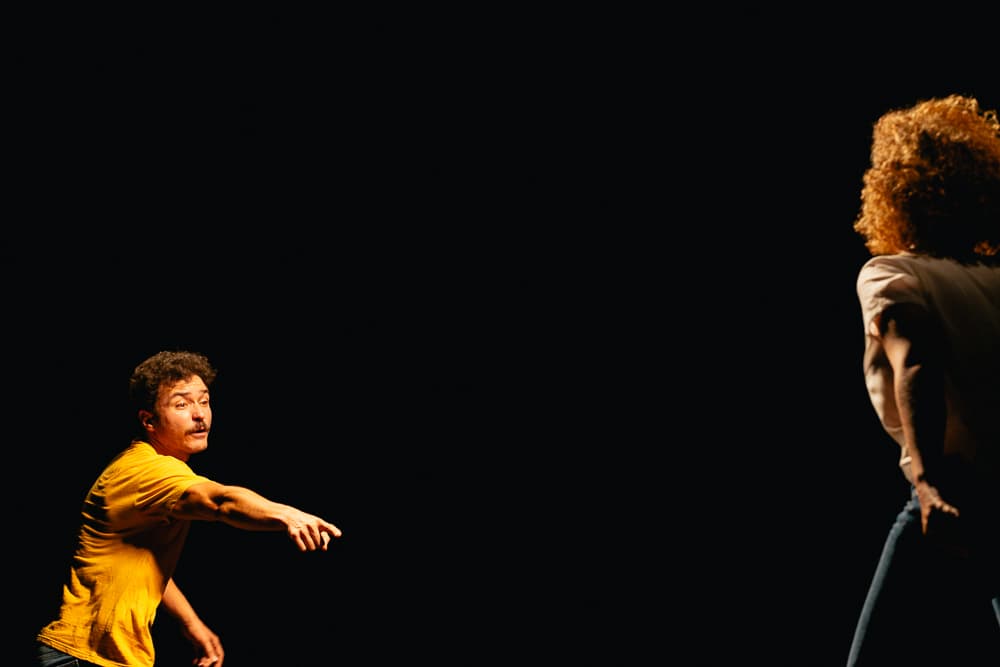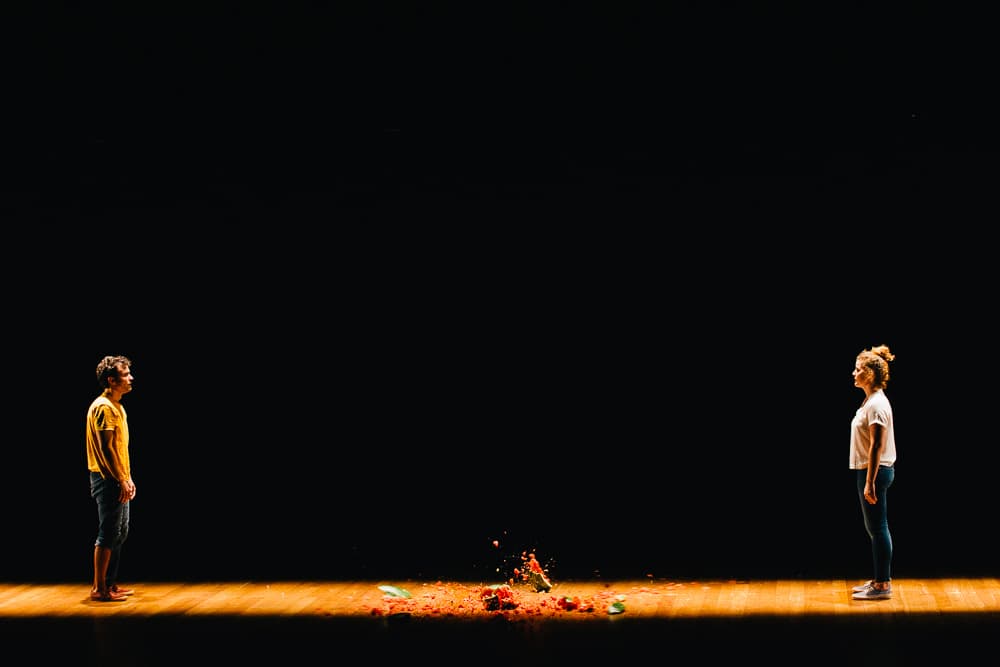Show “Encerramento do Amor” arrives in Rio de Janeiro for presentations in an intimate environment.
In national circulation, the brasiliense version of the work Clôture de l'Amour, by award-winning French playwright Pascal Rambert, brings to Rio de Janeiro a two-round discussion, that precedes the end of a relationship with several layers of complexity. The text format proposes a listening and speaking exercise.
Dhes 23, 24 and 25 September, in Espaço Tapias, in Barra da Tijuca, with free tickets.
“Who we love when we love?” is the detonating question of Love's End, directed by Diego Bresani, which arrives in Rio de Janeiro this September – since April it has been in national circulation, having already passed through Belo Horizonte, Salvador, São Paulo and Porto Alegre – for a short stay at Espaço Tápias, in Barra da Tijuca. The piece by the award-winning French playwright Pascal Rambert brings a conversation composed of two monologues that mark the end of a romantic relationship, “every long relationship has its layers and complexities, this is evoked in our work, but escaping the clichés of shows that talk about relationships”, highlights the director. The text format proposes a listening and speaking exercise.
The production that the Rio audience will watch is the Brasilia version of the work Clôture de l’Amour, by Pascal Rambert. First performed at the Avignon Festival in 2011, the work received the Grand Prix de Literature Dramatique 2012, as well as the award for best author at the Palmarés du Théâtre 2013. After the French season, Several versions have appeared for different cultures and languages, Japan and Italy, for example.
The desire to assemble a Brasiliense version of the work came from actress Ada Luana, who saw in the boldness of the text not only one of the biggest challenges he would face as an interpreter, but also the potential of human relationships. “To deal with the theme of a love that lives its last breaths in front of the public, through a duel of words, seemed to me the best way to question our ability to listen, of dialog, of understanding and welcoming the other”, comments Ada. This question found perfect eloquence in the times we are living in today in the current political-social context.
Adapting the text to Brazil brought challenges beyond translation. “It is an extremely French text in the sense of the word., in the passion they have for the word, by rhetoric. What seduced us in the text was precisely that. Too many pages of text without any punctuation. Our challenge was this, punctuate and work the text as the great score that it is. Discovering how to create each score during the show”, explica Bresani.
The research by the director and cast focused on the verb and listening as structuring elements in the construction of the narrative and conduction of expressiveness on stage.. The contemporary format proposed by the staging of the French text – a discussion that precedes the end of a relationship where only one person speaks uninterruptedly, in two rounds separated by a brief tap dance – refers the show to an intense soundscape. The distance between bodies on stage, the cleanliness and simplicity of the costumes and scenography, and the cold lighting, reinforce and direct the focus of the scenic experience to the actors' work, the act of speaking and listening.
Closing of Love premiered at CCBB Brasília, during the International Festival of Brasilia Contemporary Scene, edição 2017. In the same year, he performed a season at Teatro Sesc Garagem. In 2019 participated in the FTB – Brazilian Theater Festival, in Recife. In 2022, the show returned to national circulation, with presentations in Belo Horizonte (April), Salvador (May, during the Brazilian Theater Festival), São Paulo (July), Porto Alegre (August) and Rio de Janeiro (September). The seasons in BH, SP and RJ received support from the Culture Support Fund (DO) from the Federal District.
The performances at Espaço Tápias take place on 23, 24 and 25 September, Friday and Saturday, at 8:0 pm, and Sunday at 7pm, with free tickets. Friday's session (23) will be with a Libras interpreter.
THE PLAY AND ITS AUTHOR
Inside a big room, a woman and a man talk to each other. He's the one who starts the conversation. She listens, attentive, and responds with a second monologue. They evoke your separation, talk about before and now. Pascal Rambert does not provide a ready answer to the question: “Who we love when we love?”. It cycles through the possibilities. He doesn't deny the clichés they use, at least one time, those who separate, who look for a reason for the lack of love, that revive your memories, embellishing them before destroying everything with some killer phrases. The unbroken river of words, the questions-answers that connect, breath held in a kind of marathon between fear and release: is here, in the heart of this painful moment, that Pascal Rambert puts us. In the brutality of an omnipresent verb, in the unbelievable rigor of a cold and deadly writing, a merciless combat. He attacks and She must fight the disappearance he wants to impose on her. They have the same weapons, but they don't use them in the same way. There is male and female. There are two looks, two silences, two speeches to say the violence of a love that dies.
Pascal Rambert faith director of the Theater of Gennevilliers (T2G), which he transformed into the National Dramatic Center for Contemporary Creation, dedicated to theater, dance, Opera, contemporary art, cinema and philosophy. His creations are presented worldwide and his texts have already been translated into several languages.. His works are presented at the main festivals in Montpellier, Avignon, Utrecht, Berlin, Hamburg, New York and Tokyo. Pascal Rambert also staged several operas in France and the United States.. He directed short films that were selected and awarded at festivals in Pantin, Locarno, Miami and Paris.
ABOUT THE DIRECTOR
Diego Bresani is a photographer and theater director, graduated in Performing Arts from the University of Brasilia, in 2006. He began his directing career as assistant to Antônio Abujamra and Hugo Rodas in the show Os Demônios, which had a season at CCBB Brasília and Rio de Janeiro.. Directed several shows, among them The History of the Zoo, ranked by Veja São Paulo magazine among the 10 best pieces of 2006. In the same year, he was nominated for the Sesc Theater Candango Award., in the Best Direction category. Directed The Violence Trilogy, of Cla. Isolated Areas Sector, composed by the shows Vialenta, Risk Therapy and Anything I Eat an Egg. All nominated in the categories of Best Director and Best Show, in SESC awards, in the years 2010, 2012 and 2013. With the pieces, he traveled to several festivals in Brazil., among them the January of Great Shows in Recife. Diego has also been working with photography and theatrical lighting professionally since 2001. Currently works between Brasilia and Paris.


FACTSHEET
Direction: Diego Bresani
Text: Pascal Rambert
Tradução: Marcus Vinicius Borja
Production: Thais Felipe
List: There's Luana, João Campos and Taís Felippe
Lighting: Diego Bresani
Photography: Henri dos Anjos
Press office: Ney Motta
Realization, Scenography and Costumes: Company Sector of Isolated Areas
SERVICE
Local: Tapias space
Sign up to receive Event News
and the Universe of Arts first!
Address: Av. Armando Lombardi, 175, 2To walk, Out da Tijuca. Rua Pedro Bolato entrance.
The rotating parking lot next to the building offers a discount for those who visit Espaço Tápias.
Information: 21 97279-9684
Season: 23 to 25 September 2022; in single presentations.
Time: Friday and Saturday, at 8:0 pm, and Sunday at 7pm.
Friday's session (23) will be with a Libras interpreter.
Free tickets, with withdrawal 1 hours before.
audience capacity: 80 people
show duration: 100 minutes
Age rating: 16 years
